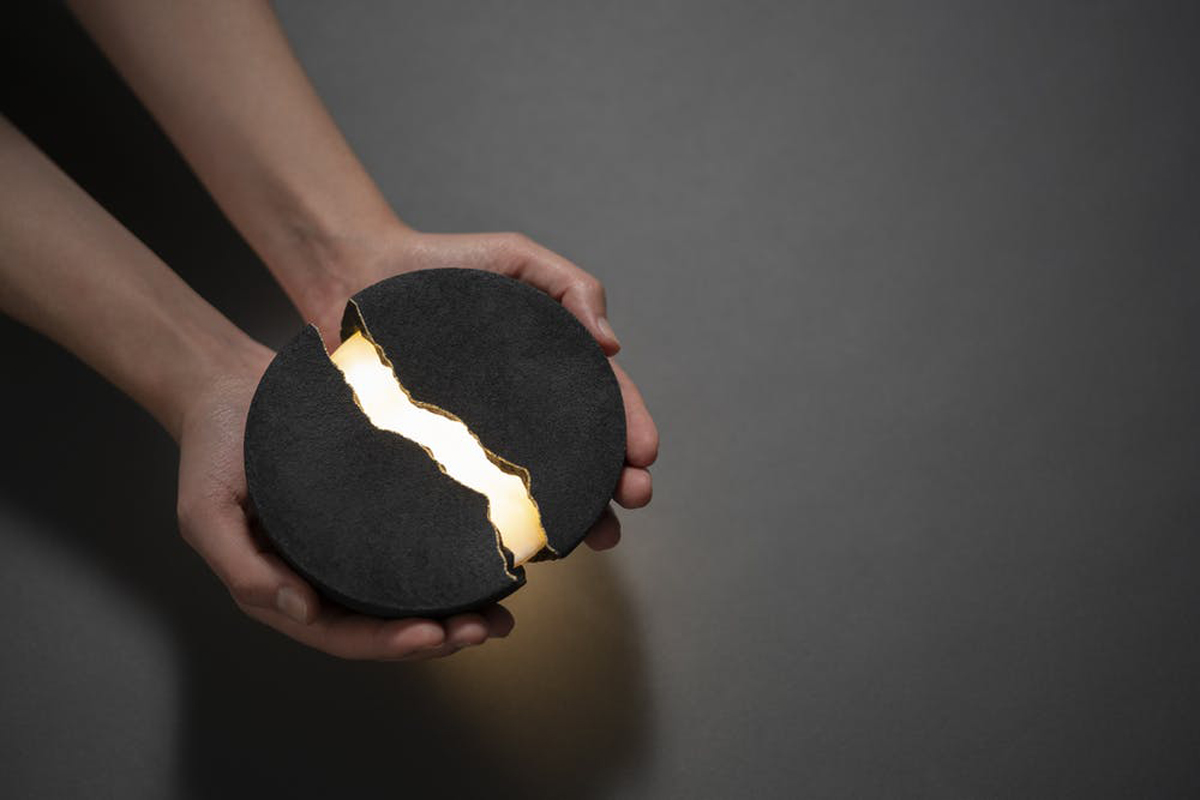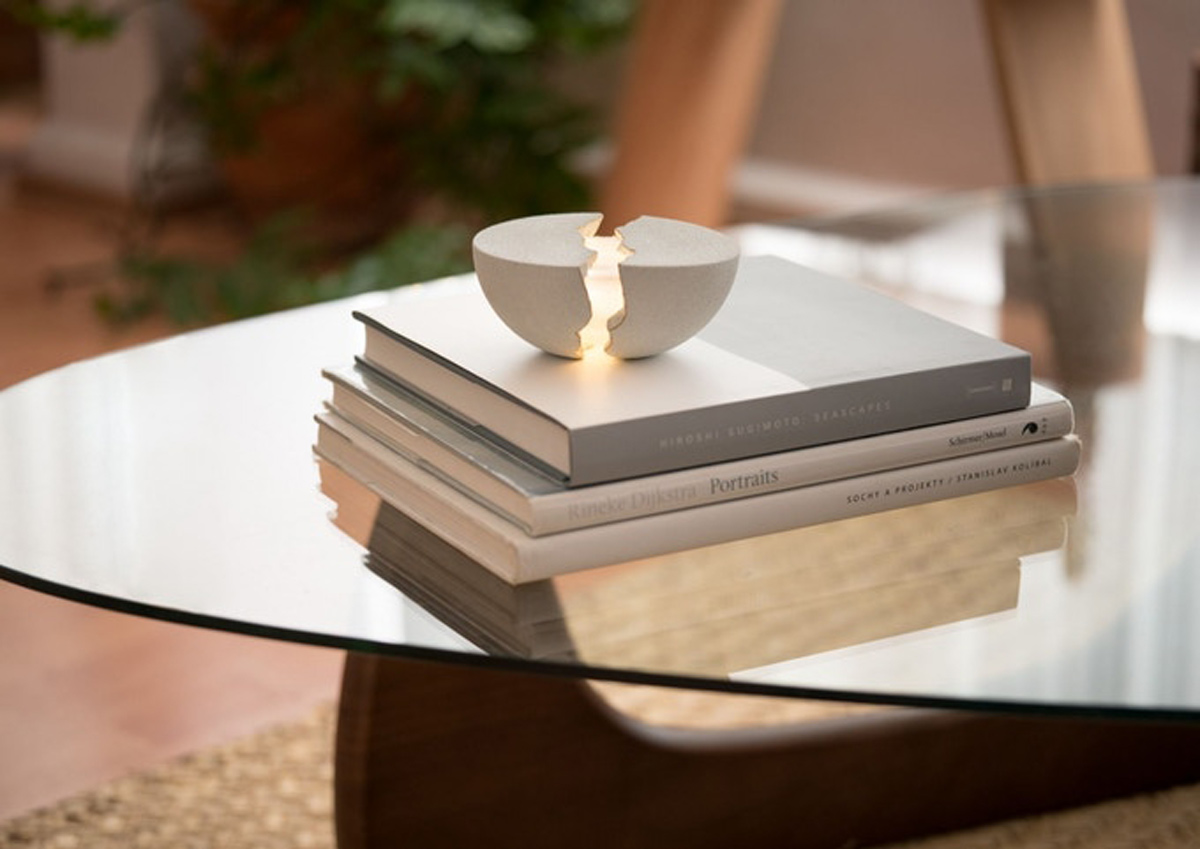Teno’s illuminated speaker will change the way you experience sound and light
With shorter days and winter on its way, everyone could use a little more light. Enter Teno, a speaker, lamp, and design object from creator Max Gunawan, the maker of the Lumio flippable book light. Inspired by the Japanese art of ‘kintsugi’, in which broken pottery pieces are reconnected with touches of gold, the bowl-shaped Teno comes alive when touched—a gold-lined ‘crack’ down its middle sliding open to reveal soft, ambient light and a high-quality sound speaker.

Technology inspired by nature
“How do I create an object that is not only beautiful, but when you interact with it, it comes alive?” This was the question Gunawan asked himself when crafting the follow-up to his wildly successful 2013 project, which was nominated for Cooper Hewitt’s Smithsonian Design Museum’s People’s Design Award and is now available at the MoMA design store. When designing Teno, Gunawan was determined to make a product that could look and sound at home in nature while still able to stand on its own as a design piece.
Over the course of the last few years, the entrepreneur found himself spending more time in nature in search of solace and inspiration. “Going into nature is when you feel the most magic, hearing all of these sounds—the stream, the birds,” he explains. While on a business trip to Japan, he found himself exploring the region’s legendary forests, known for their centuries-old healing properties.
“It’s easy to fall in love with Japan,” he jokes. But Gunawan also found himself gravitating toward the world of Japanese pottery, ceramics, and wabi-sabi, a world view centred around the acceptance of transience and imperfection, which led to the discovery of kintsugi. “When you drop a plate or a vase, rather than throwing it away, you could piece it back together. That resonated with me,” he explains, mentioning it fits into his broader belief that design and technology should seek to be sustainable, rather than be built with planned obsolescence.
Designed to last
When creating Teno, Gunawan attempted to capture the spirit of his travels with a “modern interpretation of a sound bowl” made of cast resin, its surface coated in a natural sand patina to create a unique textured pattern and tactile quality. As Teno ages, the patina continues to enhance, bringing a celebration of “perfection in the imperfect.”
“The world doesn’t need more sleek plastic surfaces,” asserts Gunawan, who hopes Teno will change the way we think of modern technological design. “I want to break the cycle of yearly upgrades and obsolescence and focus on delight, beauty, and quiet joy,” he writes on Teno’s Kickstarter page, “that feeling that I get when I drink my morning coffee from an old ceramic cup that’s only gotten more beautiful over time. Teno is very much inspired by this idea of hanging on to the few precious pieces that we have at home. Super simple and intuitive.”
Just crack it open
Unlike many other high-end sound systems, Teno is activated by finger movements across its surface enabling you to regulate the sound. To turn on its light, just “crack open the shell” and fully separate the bowl, activating the speaker, which can then stream music from your smartphone. Teno is also compact enough to hold in the palm of your hand, and is equipped with a powerful 45mm full-range driver for superior bass and treble—to adjust the volume, just slide your finger up and down the side of the bowl.
There are also four brightness levels you can adjust by tapping the top surface to activate the dimmer. Teno can also be used as a call system: to answer, just touch the top surface closer to the edge, and the surface closer to the border to end the call. With magnetic charging, the sleek charger can be placed under the bowl, its head snapping into place and an indicator light signalling when Teno is at full charge.

A luminous new age
“I wanted to create something unique, a new way of experiencing sound,” explains Gunawan, who also hopes Teno will illuminate why recycling alone won’t solve our environmental problems. “We need to change how we consume products.” He believes that Teno, designed with sustainably sourced parts and a modern aesthetic meant to become more beautiful and cherished with age, will help the industry rethink its approach to product design. “The point is not about the technology, but about the experience,” he says, “and how do I make all of these inanimate objects come alive, have a personality that you connect with? That was my philosophy and approach in designing this product. I hope it resonates.”
Teno is live on Kickstarter through 19 November, 2020.
This article was written by Kickstarter’s design and technology editor, Laura Feinstein.





